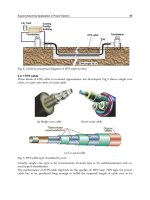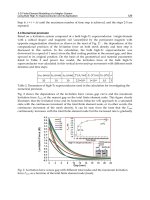The EQ interview finding employees high emotional intelligence part 8 pptx
Bạn đang xem bản rút gọn của tài liệu. Xem và tải ngay bản đầy đủ của tài liệu tại đây (570.23 KB, 10 trang )
7. Ginka Toegel, N. Anand, and Martin Kilduff, “Emotion Helpers: The Role
of High Positive Affectivity and High Self-Monitoring Managers,” Person-
nel Psychology 60, 2 (Summer 2007): 337.
64 THE EQ INTERVIEW
CHAPTER 6
Social Expertness
65
Social Expertness
Inward OutwardInward
Competency 1—Building Relationships
Competency 2—Collaboration
Competency 3—Conflict Resolution
Competency 4—Organizational Savvy
S
ocial expertness is the ability to build genuine relationships and
bonds and express caring, concern, and conflict in healthy ways.
It includes four competencies:
1. Building relationships, which is the ability to build social bonds
with others;
2. Collaboration, which is the ability to invite others in and value
their thoughts related to ideas, projects, and work;
3. Conflict resolution, which is the ability to resolve differences; and
4. Organizational savvy, which is the ability to understand and ma-
neuver within organizations.
Being adept at building and sustaining relationships leads to star
performance within organizations.
1
When all other factors are equal,
how we manage our relationships is the distinguishing factor that de-
fines success. The ability to build honorable relationships and relate
interpersonally is of critical importance to many job functions. The
more a job requires cross-departmental and/or peer interactions, the
more important building honorable relationships becomes. Also, as
people move up the corporate ladder, the need to develop enter-
prisewide solutions requires interactions with peers and others. The
quality of those interactions will often lead to the best solutions.
When those interactions are laced with collaboration, even greater
synergy and teamwork result. Those at the top of their performance
look for and create opportunities and invite collaboration. Those who
fail often don’t recognize the value of creating strong collaborative re-
lationships. In fact, research from the Center for Creative Leadership
suggests that the reasons executives fail are related to interpersonal
failures, not failures of technical competence.
2
Beyond collaboration, top performers know that conflicts are in-
evitable. So, as they build a solid foundation with peers and others,
they know that those relationships will be able to withstand the strains
of conflict. They know that expressing conflict or differences in a way
that maintains and preserves the integrity of the relationship will lead
to better results. So the ability to build genuine relationships and
bonds and express caring, concern, and conflict in healthy ways is
critical to success in many jobs.
66 THE EQ INTERVIEW
Star performers also know how to advance ideas within organiza-
tions, gain sponsors, and maneuver in complex organizations. They
recognize that organizational savvy is a required skill for getting re-
sults within organizations. These competencies are all demonstrated
within the confines of social expertness. Of course, the interviewer or
hiring manager must determine which job functions within the orga-
nization require these skills. Some job functions require these skills to
a much greater degree than others.
Consider the accounting analyst who needs data from several de-
partments in order to complete the month-end report. Her requests
may fall on deaf ears if she approaches people only when she needs
something, doesn’t bother to reciprocate, or uses a demanding tone.
However, if she has taken time to build a rapport with and establish a
genuine interest in the people she must interact with, those people
are more likely to respond favorably to her requests. It’s also impor-
tant that she respect and reciprocate when others require assistance.
The director who was responsible for implementing an organiza-
tionwide IT system provides another example. Standard procedure in-
cluded discussing needs with users, responding to user ideas and
suggestions, communicating project status, and delivering effective
user training and interface. But what the director did behind the
scenes was also critical. She had well-established working relation-
ships with all the other department heads, who knew that she lis-
tened to their needs and responded appropriately. The trust she had
built over the years was a critical factor in the success of the project.
Many other IT directors follow the same steps, but their projects are
met with resistance. The difference often comes down to the rela-
tionships that managers build.
In yet another example, a creative engineer decided that he wanted
to leave his present position; he was frustrated because no one would
listen to his ideas. The engineer had some great ideas, but he tended to
present them in an arrogant manner. His usual approach was to open
with a sarcastic remark that belittled the current system or project. He
then proceeded to argue his idea, stating that it was of course better
than the current system. His peers and even his boss felt that he was at-
tacking their previous efforts, so they didn’t support him. His ideas gen-
erally fell flat because he couldn’t get others to buy into them. Most
organizations don’t automatically respond to ideas; ideas must be sold.
SOCIAL EXPERTNESS 67
If an employee doesn’t understand that dynamic and have the skill to
gain support, he may feel as though his talents are wasted.
Social expertness comes down to very simple things. One person
said that she purposely withholds information from a coworker be-
cause the coworker talks to her only when she needs something. You
might argue that both are immature and should grow up (I agree), but
that doesn’t change the fact that the quality of one’s relationships
affects the work that gets done.
Competency 1: Building Relationships
The first competency to assess in the area of social expertness is the
candidate’s ability to build and sustain good working relationships.
Many positions require strong relationships across the enterprise; oth-
ers may require strong relationships only within the person’s imme-
diate team. Still others require that a person be able to build strong
relationships with people outside the organization. Many positions
require people to be skilled at building relationships in all directions.
According to Karl Albrecht in Social Intelligence: The New Science of Suc-
cess, how you develop relationships with people makes them want to
work with you, makes them want to work harder, and inspires them
to be more committed to their work.
3
Consider the job of an execu-
tive headhunter. The headhunter must be able to build strong rela-
tionships with the hiring company. Then she must be able to build a
trusting relationship with an executive who is successful and happy
in his current position. Why would a successful and happy executive
even talk to a headhunter? According to an article in Personnel Today,
it’s because of the headhunter’s emotional intelligence skill of build-
ing a strong relationship with the potential candidate.
4
Much research supports the value of building strong relationships
at work.
5–8
Strong relationships at work, characterized by expressing
caring, demonstrating support, sharing feelings and opinions, and deep
listening, may even encourage resilience during times of change.
9
Em-
ployees’ ability to build strong relationships also improves the overall
climate within an organization. In addition, when strong relationships
and social ties with coworkers are present, less turnover occurs.
10
There-
fore, assessing a candidate’s ability to build strong relationships can
68 THE EQ INTERVIEW
reap many benefits. As the interviewer or hiring manager, you will need
to determine the necessary breadth of these relationships. As with
many of the competencies of emotional intelligence, some job func-
tions require the competency more than others.
Questions to Assess Building Relationships
Q: Who are some key people within your organization who you cur-
rently must work with on a regular basis to get your work done?
• Describe your relationships with these people.
Q: Describe your present responsibility for building and maintain-
ing relationships at work.
• Whom do you build relationships with?
• How?
• Why?
Q: Tell me about a time when you were able to get something done
at work because of a relationship you had with another person.
Q: Tell me about some of the people whom you have to work with
on a regular basis that you find difficult to get along with.
• What have you done to build stronger relationships with these
people?
Q: Tell me about a situation when you “won someone over” at work.
• What did you do?
Q: Tell me about someone who is resistant to you.
• What did you do?
Q: Tell me about your relationship with your manager.
• What works well?
• What would you like to see improved?
Q: What do you do that makes you a good follower?
SOCIAL EXPERTNESS 69
KEY POINTS TO CONSIDER WHEN ASSESSING ANSWERS
The interviewer should determine what steps the candidate takes to
build relationships. Does she take active steps to build solid working
relationships? Or is she unaware of how to build working relation-
ships? Ideally, the candidate should recognize and take steps to ac-
tively build relationships. Evidence of steps would include being
friendly toward others by saying good morning, asking if there is any-
thing a coworker needs, inviting people to express concerns, listening
to others’ ideas, asking for input, following through on commit-
ments, taking steps to include people in meetings, and finding ways
to assist when possible. According to a study in the Journal of Organi-
zational Behavior Management, these types of expressions of positive
psychology in the workplace by peers and management lead to en-
hanced satisfaction, motivation, and productivity and create a posi-
tive workplace climate.
11
The proactive steps taken by the candidate
should be work related. We’re not looking for people who develop
friendships at work. We’re looking for candidates who value and take
actions to build honorable and respectful working relationships.
When asking the candidate about someone who is difficult to get
along with, look for evidence that the candidate has tried to build a
relationship with the difficult coworker. A few people are just very
contrary, and no amount of effort may change that. We don’t expect
candidates to have perfect working relationships with 100 percent of
their coworkers, but we do expect candidates to get along well with
most people. Be sure to probe if someone says he gets along with ev-
eryone. That’s the kind of pat answer that begs for clarification. Re-
spond with “It sounds like you’re working with a great team. Most of
us, however, at some point in our past, have encountered a team
member that isn’t easy to get along with. Can you tell me about some-
one in your past who was more difficult?”
Another important consideration is how the candidate views his
relationship with his boss. Does he view the boss as someone with
whom he should actively be taking steps to build a relationship? What
is he doing to ensure a solid relationship? In this regard, the inter-
viewer can assess how the candidate keeps his boss informed, how he
supports his boss’s mission, and how he works as a team member with
70 THE EQ INTERVIEW
his boss. The relationship with the boss is about being a good follower.
What type of follower skills is the candidate expressing? Good follow-
ers are not yes-people. They are open to direction, offer suggestions,
give honest input, put the department (and the boss) in the best light,
seek to understand the department’s mission, and help others within
and outside the organization to get the best from their department.
Competency 2: Collaboration
In many projects and positions, collaboration is an essential job skill.
Collaboration leads to improved solutions and employees’ increased
sense of ownership. Individual and organizational success and com-
petitiveness today require collaboration because integration of ideas
and information is critically important.
12
We define collaboration as
the ability to invite others to share ideas by genuinely seeking input
to problems or decisions. When people collaborate, they involve rele-
vant stakeholders, build consensus, facilitate processes or systems, and
record input.
13
Collaboration increases employees’ ownership of ideas
and level of commitment. A study in Group and Organization Manage-
ment found that when workers were permitted to exercise personal
control and to collaborate on solutions, they invested themselves more
extensively and increased the psychological ownership of their work.
14
The hiring manager or interviewer must look for evidence that the can-
didate offers peers and others the opportunity to collaborate.
However, collaboration is a two-way street. Not only must a per-
son invite others to offer ideas and solutions, but that same person
must also be willing to offer his ideas and solutions to others. Some-
times people resist participating in workplace solutions. They prefer to
keep their ideas private. These lone rangers do not see the value in col-
laboration. Still others use collaboration as a means to gain informa-
tion and then take credit for the ideas of other people. These views
not only damage the collaborative spirit in the workplace; they also
decrease problem resolution and process improvement.
Consider these examples: Ben performed routine functions at the
IT help desk. He found that users often called with the same prob-
lems. In the past, the help desk published responses to routine prob-
lems in an effort to reduce repetitive calls. Ben’s affable nature allowed
SOCIAL EXPERTNESS 71
him to build relationships with several users across the network. Ben
began to ask users whether they referred to the published responses
before calling. As he investigated the situation, he learned that users
did not find the published answers understandable. Ben began to
rewrite the answers and asked users for input. After a year, repetitive
calls were reduced by 27 percent. Ben’s skills at collaboration engaged
users and dramatically improved results for the department.
In another situation, Gary, the new shipping department supervi-
sor, decided to reorganize supplies. He came in over the weekend, on
his own time, and did a major reorganization of materials and sup-
plies. He was eager to share the improvements with his staff on Mon-
day morning. Instead, on Monday morning, his staff protested loudly.
They felt completely left out of the decision to relocate supplies. In
fact, most people had arranged the supplies to suit their own work
habits. Not only did Gary not include his staff; he somehow managed
to insult them. Although Gary’s intentions and initiative were good,
he demonstrated a failure to understand the value of collaboration.
Questions to Assess Collaboration
Q: Tell me how you recently solved a work problem.
• What process did you use?
Q: Describe a time when you had to solve a problem that involved
or affected other people within the company.
• How did you solve it?
Q: Have you ever implemented an idea or solved a problem and had
your solution meet with resistance?
• What do you think you could have done to avoid the resistance?
Q: Describe a time when you sought someone’s ideas or opinions
about a project or idea you were working on.
Q: Was there ever a time when you rejected someone’s idea or opin-
ion about a project?
• Tell me about that.
72 THE EQ INTERVIEW
Q: Tell me about a time when you offered your idea or opinion to
someone.
Q: Describe a time when your input improved someone’s work.
Q: Have you ever offered an idea or opinion at work and had noth-
ing to gain from it?
• Tell me about that.
KEY POINTS TO CONSIDER WHEN ASSESSING ANSWERS
The interviewer should be looking for two specific types of actions: ac-
tions that the candidate took to invite collaboration and actions that
demonstrate that the candidate acted collaboratively with others.
The candidate should be able to describe times when he deliber-
ately sought out the ideas or suggestions of others. As the interviewer
or hiring manager, you should look for proactive steps on the part of
the candidate that invite others into the problem-solving or idea
phase of a project. Collaboration isn’t about telling people afterward.
That might qualify as good communication, but it’s not collaboration.
If collaboration is the competency that you desire, look for action
steps. Also, follow up with questions that clarify the specific type of
input the candidate was seeking. Also, ask follow-up questions to de-
termine what the candidate did with the input. If the candidate asked
for input but didn’t use it, what steps did she take up front and after-
ward to ensure that people still felt respected or valued. Nothing can
be more demoralizing than to be asked for input and then have that
input ignored. Action steps to mitigate this type of situation might in-
clude asking for input on any of three acceptable solutions; telling
people specific reasons why their input could not be used; and mak-
ing clear to people that you are seeking advisers, not decision makers,
in the process. However, a collaborative spirit goes beyond seeking ad-
vice. True collaboration requires that we sometimes surrender the de-
cision making to the group process and that we facilitate a group
process that will generate the best result. The interviewer will have to
decide what approach is best suited to the job and the organization.
In addition, the candidate should be able to give examples of when
she behaved in a collaborative manner to help others with their ideas
SOCIAL EXPERTNESS 73









